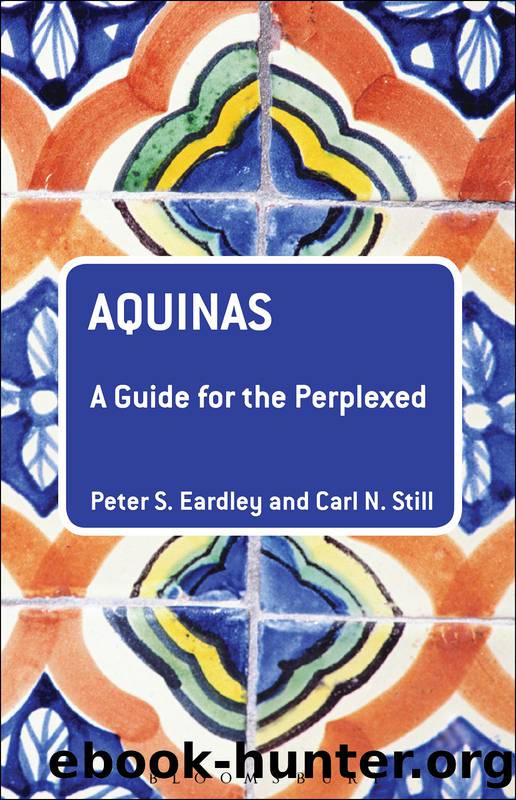Aquinas: a Guide for the Perplexed by Eardley Peter S.;Still Carl N.;

Author:Eardley, Peter S.;Still, Carl N.;
Language: eng
Format: epub
Publisher: Bloomsbury Publishing Plc
Published: 2014-08-15T00:00:00+00:00
THE VIRTUES
Aquinas is emphatic in his belief that leading a good, self-fulfiling life consists not merely in doing the right thing, but in having a good character. This places him in a tradition that goes back to the ancient Greeks, for whom the central question of moral philosophy is not simply, as tends to be the case with much modern philosophy, âWhat is the right thing to do?â Rather, the central question for Aquinas and his Greek predecessors is also and perhaps even more importantly, âWhat sort of person is it good to be?â Aquinas is often thought of as a natural-law thinker, which of course he is. Yet he is also very much a part of the Western tradition of what is now called virtue ethics. This is because his views on the importance of admirable character traits to a life well lived very much complement his views on the importance of following the prescriptions of the natural law.
In the previous section we saw that the natural law provides us with an account of the various ends of human life. At the same time, the goals that it prescribes are very general and, as it were, abstract. This can generate a certain disconnect, as it were, between the principles that are supposed to order the moral life, and the moral life itself, which is comprised of individual human actions. Put otherwise, to live a concrete, specifically good human life involves not just knowing what it is right to do in the myriad situations that comprise a proper human life, but in the acquisition of dispositions (habitus) that will make it easier for us to put our moral knowledge into practice. These are called virtues.58 For Thomas, then, the natural law directs rational agents to their ultimate end from without, as it were, by providing objective moral principles, while the virtues direct them to such an end from within.
Although Aquinas emphasizes the centrality of reason in his account of the moral life, this should not lead us to think that he denigrates the importance of the emotions and the appetites, the possession of which are part and parcel of what it means to be human.59 For although we are primarily defined by our rationality, we also have desires, both visceral and intellectual, which influence the moral life in all sorts of complex ways. Such inclinations contribute to the ultimate end if shaped properly and detract from it, if not.
We should not suppose, however, that disorders on the part of the lower desires â as when some people place sex, food and wine as their highest objects of pursuit â are the only type of disorders that derail us from leading a life worthy of a human being. The moral life is complex because the human animal is complex. This is why the virtues are important. For unlike animals, with whom human beings share the capacity for feeling and desiring individual things, human beings also possess reason and will. Unfortunately, these
Download
This site does not store any files on its server. We only index and link to content provided by other sites. Please contact the content providers to delete copyright contents if any and email us, we'll remove relevant links or contents immediately.
The remains of the day by Kazuo Ishiguro(8399)
Tools of Titans by Timothy Ferriss(7818)
Giovanni's Room by James Baldwin(6814)
The Black Swan by Nassim Nicholas Taleb(6772)
Inner Engineering: A Yogi's Guide to Joy by Sadhguru(6444)
The Way of Zen by Alan W. Watts(6290)
Asking the Right Questions: A Guide to Critical Thinking by M. Neil Browne & Stuart M. Keeley(5358)
The Power of Now: A Guide to Spiritual Enlightenment by Eckhart Tolle(5336)
The Six Wives Of Henry VIII (WOMEN IN HISTORY) by Fraser Antonia(5240)
Astrophysics for People in a Hurry by Neil DeGrasse Tyson(5003)
12 Rules for Life by Jordan B. Peterson(4165)
Housekeeping by Marilynne Robinson(4068)
The Ethical Slut by Janet W. Hardy(4041)
Skin in the Game by Nassim Nicholas Taleb(3973)
Double Down (Diary of a Wimpy Kid Book 11) by Jeff Kinney(3930)
Ikigai by Héctor García & Francesc Miralles(3899)
The Art of Happiness by The Dalai Lama(3850)
Skin in the Game: Hidden Asymmetries in Daily Life by Nassim Nicholas Taleb(3729)
Walking by Henry David Thoreau(3685)
